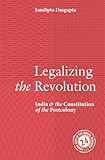Legalizing the revolution : India and the constitution of the postcolony / Sandipto Dasgupta.
Series: South Asia in the social sciences ; 24Publisher: Cambridge, United Kingdom ; New York, NY : Cambridge University Press & Assessment, 2024Description: xvii, 490 pages 22 cmContent type:- text
- 9781009525244
- 342.54 23/eng/20240317
- KNS1760 .D37 2024
| Item type | Current library | Shelving location | Call number | Materials specified | Status | Notes | Date due | Barcode | |
|---|---|---|---|---|---|---|---|---|---|
 BOOKs
BOOKs
|
National Law School | General Stacks | 342.54 DAS - 1 (Browse shelf(Opens below)) | PB | Checked out | Recommended by Prof. Dr. Aparna Chandra | 15.12.2025 | 39765 | |
 BOOKs
BOOKs
|
National Law School | General Stacks | 342.54 DAS - 2 (Browse shelf(Opens below)) | PB | Checked out | Recommended by Prof. Dr. Arun K Thiruvengadam | 08.10.2025 | 39766 |
Includes bibliographical references and index.
Introduction : decolonization and constitution -- The anticolonial movement -- Transformations -- They, the people -- The constitutent administrator -- Democracy and parliamentarism -- Rights and repression -- Property and labour -- Judiciary and lawyers -- Conclusion : postcolonial afterlives of law and revolution -- Epilogue : the biographies of the Indian Constitution,
"Anticolonial movements of the twentieth century generated audacious ideas of freedom. Following decolonization, the challenge was to give an institutional form to those ideas. Through an original account of India's constitution making, Legalizing the Revolution explores the promises, challenges, and contradictions of that task. In contrast to familiar liberal constitutional templates derived from the metropole, the book theorizes the distinctively postcolonial constitution through an innovative synthesis of the history of decolonization and constitutional theory. The first half of the book traces the contentious transition from the tumult of popular anticolonial politics to the ordered calculus of postcolonial governance. The second half explains how major institutions - parliament, judiciary, civil liberties, and property - were formed by that foundational tension. A major contribution to postcolonial political theory, the book excavates the unrealized futures imagined during decolonization. At the same time, through a critical account of the making of the postcolonial constitutional order, it offers keys to understanding the present crisis of that order, including and especially in India"-- Provided by publisher.
There are no comments on this title.
